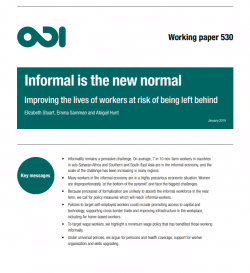
Policy highlights:
- On average, 7 out of 10 non-farm workers in countries in Sub-Saharan Africa and Southern and Southeast Asia are in the informal economy, and this number is still increasing. Many workers in the informal economy are in a precarious economic situation. Women are disproportionately represented at the ‘bottom of the pyramid’ and face the biggest challenges.
- Because processes of formalization are unlikely to absorb the informal workforce in the near term, the authors call for policy measures that will reach informal workers. Ensuring improvement across a range of areas, including income, wellbeing and empowerment requires an integrated, comprehensive approach to improving outcomes. This is especially evident from microfinance interventions like cash transfers.
- Policies that target self-employed workers could include policies aimed at promoting access to capital and technology, supporting cross-border trade and improving infrastructure in the workplace, including for home-based workers. To target wage workers, the report highlights a minimum wage policy that has benefited those working informally.
- Under universal policies, the authors argue for pensions and health coverage, support for workers’ organizations and skills upgrading. Informal apprenticeships are receiving increasing attention as a locally-embedded form of skills development. This is the most common form of skills training in Africa for the informal sector, with up to 70% of urban informal sector workers trained in this manner. An average of 20% of young adults in five Sub-Saharan African countries with comparable data had been informal apprentices, with this figure reaching 35% in Ghana.










